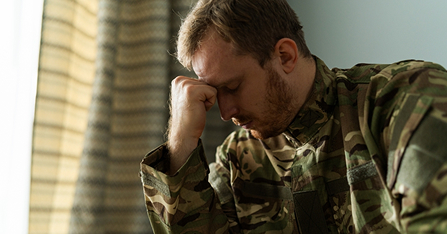Understanding VA Disability for OCD
OCD ranks among the most debilitating, stressful, and expensive-to-treat medical conditions that a person can experience. Whether it is due to exposure to trauma, biological factors, or a combination of other factors, research studies show that veterans experience high prevalence of OCD and are at risk for severe impairment due to their symptoms. While OCD VA disability benefits are available to offset the financial costs and emotional burden of this condition, successfully obtaining benefits is often much more difficult than it should be.
As a nationally recognized, veteran-owned law firm, we advocate for the rights of veterans who have been excluded from the system. Whether you are trying to increase your OCD VA rating or you are stuck in the endless appeal-and-denial cycle, our team of experienced VA mental health claim attorneys can help. To learn more, consider contacting us to schedule your free case review today.

Contact Us Today
We Will Fight For Your Benefits
We guarantee 100% privacy. Your information will not be shared.
What Are the Signs and Symptoms of OCD?
Obsessive Compulsive Disorder, known as OCD, is a condition that causes a person to experience unwanted, intrusive thoughts (obsessions) and/or engage in repetitive behaviors (compulsions). Obsessions and compulsions can interfere with a person’s social interactions, employment, and ability to complete daily tasks.
OCD obsessions are persistent, recurring thoughts that cause distress and anxiety. Oftentimes, obsessions have identifiable themes such as:
- Contamination
- Issues tolerating uncertainty
- Aggressive thoughts about harming yourself or others
- Desire to have symmetry, order, and perfection
- Profound fear of making mistakes
These obsessions typically manifest in compulsive behaviors that are meant to relieve stress and anxiety. A person may make up rituals or rules to quell anxiety and obsessive thoughts. Some common examples of compulsive behaviors include:
- Ordering and arranging items in a very specific way
- Repeatedly counting or checking things
- Bathing or washing over and over
- Following an excessively strict routine
- Praying or repeating specific words
Does the VA Consider OCD to Be a Disability?
Members of the armed forces are required to place themselves in great danger for their country. Many veterans report experiencing tragic and traumatic situations that have had a lasting impact on their health and well-being. While the exact causes of OCD are not well understood by scientists, research indicates that stressful events and psychological trauma can play a role in the development of this debilitating condition.
The VA does consider OCD to be a disability, but to obtain financial support for your condition, you must provide evidence of the following:
- You have a current diagnosis of OCD
- An in-service event, illness, or injury occurred
- The symptoms of your OCD are connected to the in-service event, illness, or injury
If these three criteria are fulfilled, you may be entitled to OCD VA disability benefits for your condition. Proving service connection for OCD is difficult, however, and the VA will look to see that you have provided a variety of evidence to support your claim.

How Do You Prove Service Connection for OCD?
Proving service connection for OCD can be complex and the VA requires a breadth of evidence demonstrating the nexus (or connection) that exists between your condition and an in-service stressor. As long as your disability is connected to your military service in some way, whether it was caused by your service or aggravated by your time in the military, you may be entitled to receive VA disability benefits. At VetLaw, we take a comprehensive approach to proving service connection for OCD, leveraging a range of evidence including:
- Objective medical documentation such as doctors’ notes, C&P examinations, lab tests, treatment and rehabilitation records, and diagnoses.
- Lay and buddy statements describing how your condition impacts your life on a day-to-day basis.
- Nexus letters from medical professionals that connect your OCD to your time in service.
- Employment records to provide evidence of how your OCD interferes with your work.
It is not enough to simply say that your disability was caused by your military service. Rather, you and your attorney must prove that your condition stems from your time in the armed forces by providing evidence from reliable and relevant sources. With the right strategy in place, you can feel confident that the VA will assign an OCD VA rating that reflects the severity of your condition and symptoms.
What Is OCD VA Rating?
The VA rates OCD using the Schedule of Ratings for Mental Disorders. Based on the criteria set forth in this schedule, the VA will evaluate the symptoms of your condition, the severity of your symptomatology, and the level of social and occupational interference you experience. Using this information, you will be assigned an OCD VA rating of 0, 10, 30, 50, 70, or 100 percent, which can be categorized as follows:
- 0 percent if you were previously diagnosed with OCD but your symptoms do not affect your day-to-day life
- 10 percent if you experience mild or transient symptoms which impact your efficiency at work but only during periods of high stress or if your symptoms are controlled using medication.
- 30 percent if you experience symptoms like depressed mood, anxiety, or panic attacks that occasionally impact your work, relationships, and ability to perform occupational tasks.
- 50 percent if you experience symptoms like flattened affect, weekly panic attacks, memory impairment, or impaired abstract thinking that regularly reduce your work reliability and productivity and regularly interfere with your relationships and occupational functioning.
- 70 percent if you experience symptoms like obsessive rituals that interfere with daily routines, near-continuous panic, or impaired impulse control that results in deficiencies across several areas of your life.
- 100 percent if you experience total occupational and social impairment due to symptoms such as delusions, hallucinations, danger of hurting yourself or others, or inability to perform activities of daily living.
What If the VA Denies Your Disability Claim for OCD?
If the VA denies your claim for OCD VA disability benefits, you may appeal the decision and continue fighting for the compensation you deserve. Under the Appeals Modernization Act, the VA established three appeal options for claims denied after February 19, 2019, including:
- Submitting a Supplemental Claim to provide new and relevant evidence to support your claim.
- Requesting a Higher-Level Review to have your claim re-evaluated by a more senior adjudicator.
- Appealing to the Board of Veterans’ Appeals to request a direct review, submit new evidence, or ask for a hearing with a Veterans Law Judge.
At VetLaw, our appeals team will review your claim, identify the proper appeal channel to maximize your chance of success, and fight for your rights at every step of the appeals process. For most VA benefits, you have one year from the date of your decision letter to file an appeal. Do not hesitate to take action – your ability to receive compensation depends on it.
Hiring an Attorney Near You to Help with Your VA Disability Appeal for Your OCD Claim?
Filing a claim for OCD VA disability benefits can be a stressful and overwhelming process, especially if you are juggling medical and financial hardships. We serve as advocates for veterans and their families. Dealing with the VA requires a level of expertise that many do not possess. Let VetLaw make the difference by helping you navigate your VA disability claim or appeal. To get started, consider scheduling your no-risk, no-obligation free case review today.

